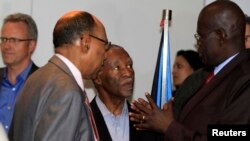Sudan and South Sudan have agreed that by March 14 they will pull back their troops from a buffer zone along their border. Marthe van der Wolf reports for VOA from Addis Ababa that both countries signed an agreement on Friday night to implement a security deal.
The agreement signed by defense ministers of Sudan and South Sudan outlines how and when security arrangements will be implemented. The signed document also says that troops should be pulled back from the common border by March 14.
African Union mediator Thabo Mbeki says the signed documents are very specific:
"They include an implementation for the agreement with the matrix which says this date to date is what must be done and so on. So it's got the specific timeframes for the implementation of all the agreements, so they are not general documents, they are specific documents which will require implementation about all elements that have got to do with the security arrangements between the two countries," Mbeki said.
Ongoing disagreements over the Abyei region and resuming oil production were not discussed during this round of negotiations. Lead negotiators of both countries are expected in Ethiopia this week to discuss those issues.
Both countries signed nine agreements in September last year relating to oil, security, and trade. Both Sudan and South Sudan failed to implement any of the agreements and did not withdraw troops from the border.
South Sudan’s Defense Minister John Kong Nyuon said that there are no more obstacles now to start implementation:
"An obstacle to the implementation of this agreement was the security arrangement. So the security arrangement was one of the preconditions for not implementing the other agreements. So now, after signing this agreement and we accept and agree on the 14-miles, we will withdraw all our forces from the 14-miles and other areas according to the agreement," Nyuon said.
Delegations of the neighboring countries will further discuss the security arrangements on March 17. Until then the delegations will hold meetings on how to implement the other agreements relating to trade and oil. Resuming the production of oil is of crucial importance to the economy of both countries.
President Omar al-Bashir of Sudan and President Salva Kiir of South Sudan have met twice since the beginning of the year to discuss the deadlock in the implementation process.
Sudan and South Sudan separated in July 2011 after decades of civil war.




